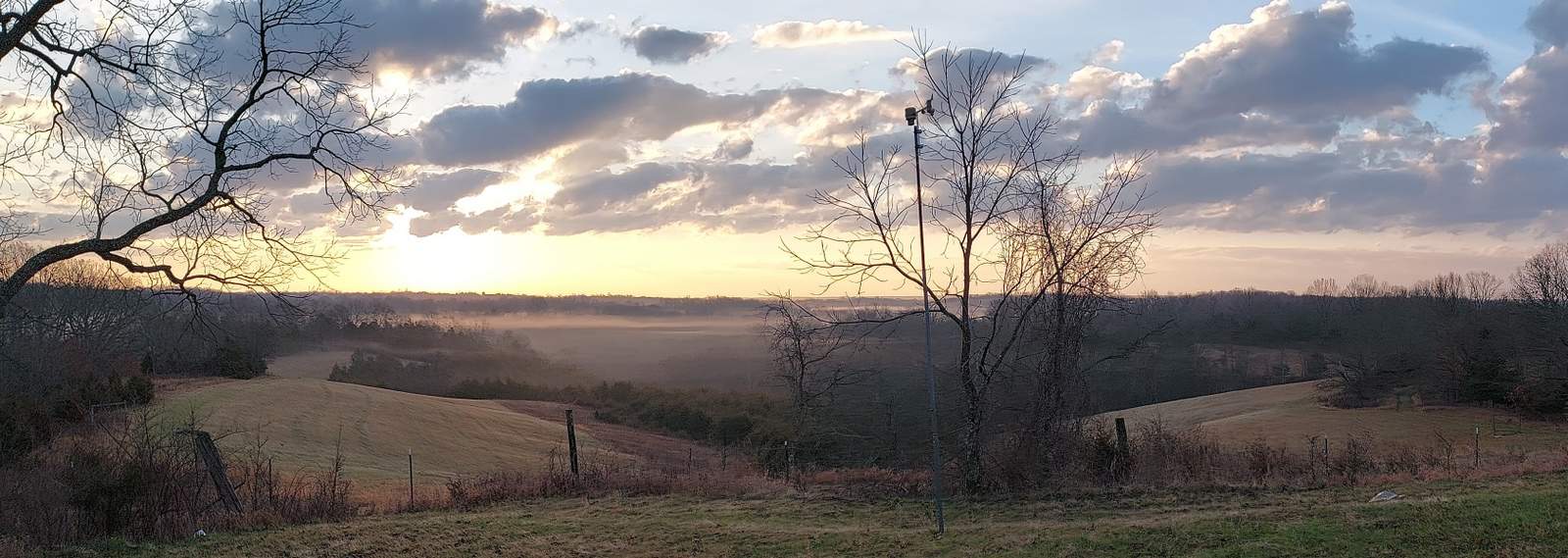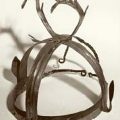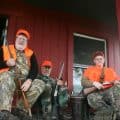The Role of Personal Ethics in Hunting
It seems that every time I go and knock Ted Nugent, I get blasted for being un-American, against the sport of hunting, and a general waste of good air. So when I decided to comment on Ted’s latest missive on D&DH Ethics Shmethics, I figured it was time to take a new tack. In order to bang through all the hero worship and blind fawning from his acolytes, I figured it was time to try and put out something positive. Everyone hates complainers that don’t have a solution in mind. I need to pick up the ethical shovel and craft my own.
When we go hunting, we are going out into our own little inkblot test. This is not a sport like Football. It is not a game like Checkers or Gin Rummy. It is a free-form sort of thing, played with deadly weapons. We each carry our own little set of rules with us, our own ethics, and we try to follow them as best as we can. Ted has his. I have mine. Ted may think we don’t need ethics, and that the important thing here is getting together to stamp out all the stupid laws that limit his enjoyment of the outdoors. My personal feeling is that without ethics, the woods would be chaos.
As I said, when I go out the door to hunt, I am carrying a set of rules with me that govern my behavior in the woods. You can break them down into three categories: the external laws that are set down by the Government, the intrinsic laws of safety, the rules of conduct understood by my hunting group, and my own personal rules.
The Government Rules:
The Government sets down game rules. You can find them a bit bewildering at times, but they generally fall into a few broad categories:
- When can I hunt?
- Where can I hunt?
- What can I use to kill ’em?
- How many can I bag?
- What do I do with them after they’re dead?
Most states have a few fliers in there just to make it interesting. Most states’ rules fit into a format the size of a comic book. I do not see any big problem so far. One thing is for sure: complaining about them the night before season opens is not going to change things. Deliberately breaking them is not going to change things, neither is complaining to the judge after you have been cited. Get the comic book. Read it. Learn it. If you find something objectionable, make a note to write your state congressman. Every year, every state, every season, you should pick up the latest issue of the comic book and read it.
Believe me, I have plenty of beefs with what is in the comic book, and I have had my share of screw-ups. My home is within 20 miles of two state borders. Dates shot size, caliber– they all run together after a while. The point is that there are going to be a few rules you just have to follow. If you hunt more than a few states every year, you probably have someone in your entourage that you can hire to read all the comic books for you.
The point is that there is really no excuse to hunt outside the law unless you just do not care. Never trust the guy who gave you permission to hunt to be an expert on the law either. I cannot count the times I have had the landowner tell me it was okay to hunt a plot when it was not his or have the landowner show up to the Shotgun Opener with a 30-30.
The Basic Rules of Safety and Conduct
You probably do not need a lecture on gun safety from me. Tagging another man’s deer is bad. Going into the field when you are in the bag is wrong. Hunter Ed covered all these. You have your card. You do not need me to remind you. What I will say is this: you have to decide what is right for you.
Under most circumstances, I no longer carry shotguns or rifles with a hot chamber. I have taken too many spills and plugged too many barrels, and I have two sons that started accompanying me into the field a decade ago, and it just was not worth the risk. I also usually load my deer rifle with 3 rounds, whether the magazine holds 4 or 5 or 10. The reason? I have found that if I have shot 3 times and not dropped what I shot, it is probably a good time to settle down and rethink my strategy.
The Rules of Your Own and Those of Your Group
At this point, let me combine the customs of my local group of hunters and those that are personal to just me and discuss them together. Most of us carry around a few personal rules; these are private. No one else understands or needs to.
First, let me trot out the Rules of Fair Chase and Hunter Ethics
(from the Boone & Crockett Club website)
FAIR CHASE STATEMENT
FAIR CHASE, as defined by the Boone and Crockett Club, is the ethical, sportsmanlike, and lawful pursuit and taking of any free-ranging wild, native North American big game animal in a manner that does not give the hunter an improper advantage over such animals.HUNTER ETHICS
Fundamental to all hunting is the concept of conservation of natural resources. Hunting in today’s world involves the regulated harvest of individual animals in a manner that conserves, protects, and perpetuates the hunted population. The hunter engages in a one-to-one relationship with the quarry and his or her hunting should be guided by a hierarchy of ethics related to hunting, which includes the following tenets:1. Obey all applicable laws and regulations.
2. Respect the customs of the locale where the hunting occurs.
3. Exercise a personal code of behavior that reflects favorably on your abilities and sensibilities as a hunter.
4. Attain and maintain the skills necessary to make the kill as certain and quick as possible.
5. Behave in a way that will bring no dishonor to either the hunter, the hunted, or the environment.
6. Recognize that these tenets are intended to enhance the hunter’s experience of the relationship between predator and prey, which is one of the most fundamental relationships of humans and their environment.
Okay, now we are getting somewhere! Now we have something truly ethical to bite into. Let me pick these apart a little bit. First off, notice how these are not written down like state codes. They are more like the Rules of Golf.
Golf has only a handful of rules. The point of golf is not to see how many rules you can break, but how well you can uphold them. You are expected to self-censor and understand the meaning of the rule and not just try to hold to its letter. Mind you, I cannot stand playing golf, but I really have to respect the ethic.
Compare that to a game like Backgammon. In the official rules of Backgammon, anything goes so long as your opponent does not catch it before he picks up the dice to roll for his turn. If he catches you cheating, the most he can do is ask you to put back the move. You can kick a stone with your pinky, you can cheat your head off. It is all part of the game. The trick is not getting caught. I loved playing Backgammon back in the Disco Era. However, that is a game played on a board with dice. Backgammon is not a blood sport. I never tried to play it armed with a 12 Gauge. If you play at hunting that way, I do not want to be anywhere around.
Another thing worth pointing out is how vague the rules of Fair Chase are. It does not say ” Baiting is prohibited.” “Hunters will not take game from a raised blind.” This is open to interpretation. The point is that everyone is expected to have an understanding of what is meant by “taking of any free-ranging wild, native North American big game animal in a manner that does not give the hunter an improper advantage . . .” What is free-range? What is an improper advantage? Where does one go for answers?
Go back to the hunting laws. If it is against the law, it is not part of Fair Chase. Forget about whether the rule makes sense to you. It is a rule. If you have questions, go back to your deer camp. What do they think? (rule #2)
Most important: What do you think? In fact right there in the middle of the B&C ethics statement is this gem: ” Rule #3: Exercise a personal code of behavior that reflects favorably on your abilities and sensibilities as a hunter.”
What does that one mean?
I often say that I learn more about myself in a day afield than I learn in a year of doing anything else. This is at the heart of Rule #3. Do we break rules? Yes. Have I done things that I was glad the game warden did not see? Yes. Was I proud of them? No. The point is that we, as hunters, are out there to observe Rule #3, and furthermore observe #2 and #1 at the same time.
If this were golf, if we kick the ball out of the rough or take a 5 when it really took 8 just to reach the green, nobody, no umpire or a referee, is there to dock us. There is not even a scorecard to sign. The point is we do what we do out in the woods because we think it is right. When we fall down, we need to acknowledge it to ourselves and try to do better.
Ignorance is not an excuse for rule #1– we should have read the comic book before we got there. Rule #2? That one is tougher, but we need to be attuned to those around us. If we see another hunter shaking his fist at us, we know we have certainly done something wrong. The important thing here is that we internalize them. These are not stupid rules, meant to be bent or broken. Our fellow hunters are not all cretins. The laws were put there by rational men to keep their fellow men safe and to protect the herd.
You may not understand the rationale, but that’s okay. Hopefully, someone will recognize that fact and start telling the jokes slower to you from now on. If we find ourselves constantly surrounded by foaming idiots who do not understand us, stupid laws, incomprehensible rules, and angry stares, there is probably something wrong with the way we are looking at the inkblot.
Why should I give a rat’s patooty what anyone else thinks? I just want to go out and hunt.
Look, it is getting to be a crowded world. It used to be you could pull off the side of the road, walk into the woods a little way and do just about anything you wanted. Nobody knew. Nobody cared. However, nowadays they have cut up the Woods into small plots. No one wants a bullet coming through their front window. Nobody wants a guy walking under their treestand with their finger on the trigger. It’s getting crowded out there.
Most importantly, even if you do not believe the rules were written for a good reason, the world will still judge you on your ability to follow them. It may seem unfair, but sometimes the orange on your back and the way you port your gun is going to be the only way folks have to go on in deciding whether you are a hunter or a poacher, a sportsman or a moron out running around in the woods with dangerous-looking objects in your hand. Walking into the board room with your zipper down has always been considered a career-limiting move. No one will be considering your MBA from Harvard when they judge you.
Look at the rest of the rules of ethics stated by Boone and Crockett: (I’ll paraphrase)
#4 Aim at what you mean to hit and hit what you aim at.
#5 Don’t honk off people so they think you’re an undisciplined ass.
#6 Get a grip on what’s real here.
I used to work in a frozen cheeseburger factory. The safety guy and I were talking one day. He had just published a new 5 page set of safety rules. He wanted to know what I thought.
“I think you can boil it all down to one simple rule,” I said. “Endeavor at all times to not become part of our product.” He did not like the suggestion.
I suppose I could draw a comparison to hunting ethics. The whole point here is to not be the kind of jerk that you always complain about, right? Don’t be the reason that your neighbor has to post a No-Hunting sign.
Or maybe it all goes back to Rule #3: Exercise a personal code of behavior that reflects favorably on your abilities and sensibilities as a hunter.
Your Own Code
So far, I have mixed the ethics of who you really are and the folks you hunt with together. Let me split that last one out and then I will be on my way. How you hunt ultimately dictates who you are. At very least it will be a mirror for you to examine yourself. Whether you take the time you are afield to look in it will be up to you. If you come home feeling empty or despairing after a hunt, because you have let yourself down, that is as real or perhaps even more real than breaking a law.
Only you can really judge yourself, and just because the rule is not in writing does not mean it will go away. You have your own list of what you’ve tried to slough off over the years. The important thing to remember is that your conscience exists for a purpose and a hunter needs to listen to it. If you always come back from a hunt with a clean conscience and go straight to bed, there is probably something wrong.
You are going to be known more for what you hold sacred than that which you tear down. Hunters are an odd lot in that we practice our ethic on the knife-edge between life and death. Life is sacred, but there is going to be a list of other things that you will or will not hold to be so. That list does not have to be on your sleeve, but it should be foremost in your mind. It will take a lifetime to build that list and to acquire the memories that bolster it. You will fall and you will pick yourself up many times. In the end, I pray that you will find the balance will have made it all worthwhile.
This post has already been read 1851 times!
Views: 3








Bowhunter for ten years love ted till his rescent stupidity, always was crazy. Amen brother keep fighting!